
The Internal Macedonian Revolutionary Organization, was a secret revolutionary society founded in the Ottoman territories in Europe, that operated in the late 19th and early 20th centuries.

Hristo Tatarchev was a Macedonian Bulgarian doctor, revolutionary and one of the founders of the Internal Macedonian Revolutionary Organization (IMRO). Tatarchev authored several political journalistic works between the First and Second World War.
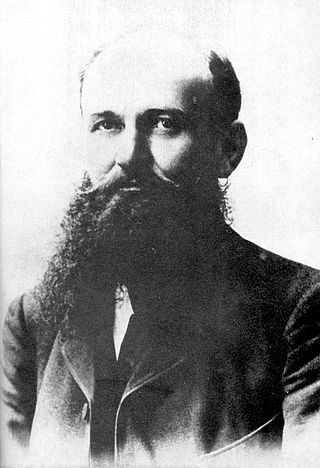
Gyorche Petrov Nikolov born Georgi Petrov Nikolov, was a Bulgarian teacher and revolutionary, one of the leaders of the Internal Macedonian Revolutionary Organization (IMRO). He was its representative in Sofia, the capital of Principality of Bulgaria. As such he was also a member of the Supreme Macedonian-Adrianople Committee (SMAC), participating in the work of its governing body. During the Balkan Wars, Petrov was a Bulgarian army volunteer, and during the First World War, he was involved in the activity of the Bulgarian occupation authorities in Serbia and Greece. Subsequently, he participated in Bulgarian politics, but was eventually killed by the rivaling IMRO right-wing faction. According to the Macedonian historiography, he was an ethnic Macedonian.

Unification Day on 6 September is a national holiday of Bulgaria. It commemorates the unification of Eastern Rumelia and the Principality of Bulgaria in 1885.

The Unification of Bulgaria was the act of unification of the Principality of Bulgaria and the province of Eastern Rumelia in the autumn of 1885. It was co-ordinated by the Bulgarian Secret Central Revolutionary Committee (BSCRC). Both had been parts of the Ottoman Empire, but the principality had functioned de facto independently whilst the Rumelian province was autonomous and had an Ottoman presence. The unification was accomplished after revolts in Eastern Rumelian towns, followed by a coup on 18 September [O.S. 6 September] 1885 supported by the Bulgarian Prince Alexander I. The BSCRC, formed by Zahari Stoyanov, began actively popularizing the idea of unification by means of the press and public demonstrations in the spring of 1885.

The Principality of Bulgaria was a vassal state under the suzerainty of the Ottoman Empire. It was established by the Treaty of Berlin in 1878.

Andrey Tasev Lyapchev (Tarpov) (Bulgarian: Андрей Тасев Ляпчев (Tърпов)) (30 November 1866 – 6 November 1933) was a Bulgarian Prime Minister in three consecutive governments.
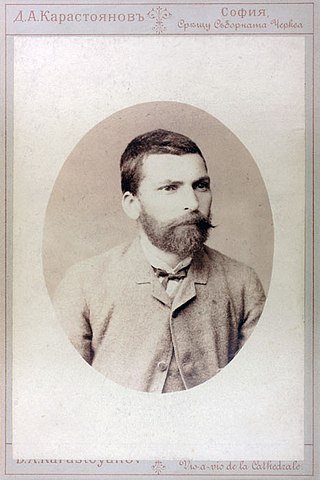
Zahariy Stoyanov, born Dzhendo Stoyanov Dzhedev, was a Bulgarian revolutionary, writer, and historian.

Metodija Andonov-Čento was a Macedonian statesman, the first president of the Anti-Fascist Assembly of the National Liberation of Macedonia and of the People's Republic of Macedonia in the Federal People's Republic of Yugoslavia after the Second World War. In the Bulgarian historiography he is often considered a Bulgarian. The name of Čento was a taboo in Yugoslav Macedonia, but he was rehabilitated during the 1990s, after the country gained its independence.

Andon Dimitrov was a Macedonian Bulgarian revolutionary. He was among the founders of the Internal Macedonian Revolutionary Organization (IMRO).

Ivan Garvanov was a Bulgarian revolutionary and leader of the revolutionary movement in Ottoman Macedonia and Southern Thrace.
Parvenets is a village in the Plovdiv Province, southern Bulgaria. It is part of the Rodopi municipality. As 2008, the village has 3,463 inhabitants.
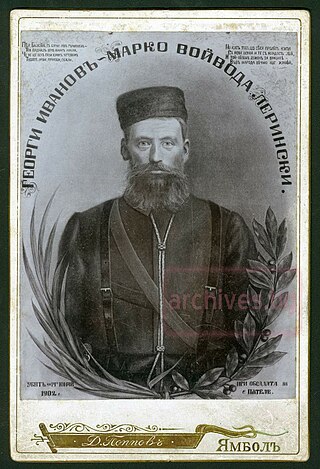
Marko Lerinski was the nickname of Georgi Ivanov Gyurov, also known as Georgi Geroyski, a Bulgarian military expert and revolutionary. A prominent member of the Internal Macedonian–Adrianople Revolutionary Organization (IMARO), Lerinski was the first person to propose a common anti-Ottoman uprising in Macedonia and Thrace.

Hristo Andonov (1887–1928) was a Bulgarian revolutionary and a leader of the Internal Macedonian Revolutionary Organization (IMARO).
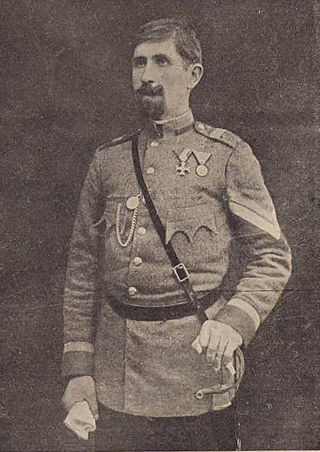
Dimitar Andonov was a Bulgarian officer and revolutionary, a leader of an Internal Macedonian-Adrianople Revolutionary Organization (IMARO) revolutionary band for the Prilep region.

Georgi Ivanov Stranski was a Bulgarian physician and politician. A close friend of Hristo Botev, Stranski was an active member of various organizations founded by Bulgarian emigrants in Romania. After the Liberation of Bulgaria in 1878, Stranski was one of the leaders of the Liberal Party of Eastern Rumelia, and its successor after the Bulgarian unification in 1885, the all-Bulgarian People's Liberal Party of Stefan Stambolov. Between the accomplishment of the Bulgarian unification on 6 September 1885 and its international recognition in mid-1886, Stranski was the only ever Commissar of South Bulgaria.

Petar (Pere) Naumov Toshev was a Bulgarian teacher and an activist of the Internal Macedonian-Adrianople Revolutionary Organization. In the historiography in North Macedonia he is considered an ethnic Macedonian revolutionary.
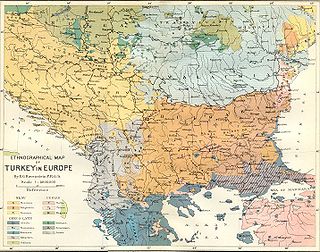
Bulgarian Millet was an ethno-religious and linguistic community within the Ottoman Empire from the mid-19th to early 20th century.

Autonomy for the region of Macedonia and Adrianople Thrace within the Ottoman Empire was a concept that arose in the late 19th century and was popular until ca. 1920. The plan was developed among Macedonian and Thracian Bulgarian emigres in Sofia and covered several meanings. Serbia and Greece were totally opposed to that set of ideas while Bulgaria was ambivalent to them. In fact Sofia advocated granting such autonomy as a prelude to the annexation of both areas, as for many Bulgarian emigres it was seen in the same way.

Petar Georgiev Mandzhukov was a Macedonian Bulgarian revolutionary and anarchist, member of the Internal Macedonian-Adrianople Revolutionary Organization and of the Supreme Macedonian-Adrianople Committee.



















